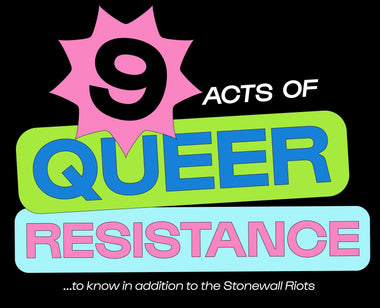Sexport: How Sex Toys Can (and Cannot) Make Their Way Around the World

**Originally published in 2018**
A few months ago, I was given what seemed to be a simple request — do some research on what countries we might run into some trouble getting our products through customs. It was a rare occurrence, but not unheard of. Occasionally, items would be removed or confiscated before they ever made it to the customer. However, even when advised about the possible difficulty (or even futility) of trying to get their order through customs, some customers insisted on sending the products anyway, making it clear that the demand is there and the risk — worthwhile. Luckily, we’ve had some successes and we got to know some nice folks abroad while doing it but we still wanted to know more.
Before I go any further, hey y'all — I'm Shazi, the Director of Supply Chain at Unbound! My daily duties revolve around keeping our customers happy, from offering product suggestions to setting up subscriptions, and even smoothing out shipping hiccups. In that vein, I began an odyssey of my own. The answers I found were not so straightforward, but through much world wide web surfing, this piece (and a very niche area of expertise) was born!

Looking into the who and why of customs arrangements led me down a path I would have never expected to find. Suddenly I was neck deep in import laws, obscenity laws, privacy rights, and cultural stigmas. I was fascinated by my findings, and I hope you find them interesting too.
How we view and regulate the sex toy industry is not only relevant to those involved in the buying and selling of product but it matters in larger conversations about censorship and privacy. It holds value in discussions of self-expression and how we define and place profanity in our societies. It would be reductive to say that someone not being able to buy a dildo is a personal problem because that issue includes access to sexual materials and concerns about how much of our private lives the government should be involved in. I’m not trying to say that we should be making it rain vibrators from every rooftop, but goods for sexual wellness and education should be accessible for the people seeking them out.

With the advent of e-commerce, buying sex toys has never been easier or more discreet. Your new favorite vibrator is just a couple of clicks away, and there is a myriad of websites to choose from in every corner of the world. Sexperts and customer service reps are on standby, ready to help you make an informed decision about your pleasure. It feels as if a universe of possibility is there, dangling inches from your fingertips.
For some of us, this is merely a fantasy, and perhaps more trouble than it’s worth. Whether you’re trying to get your Ollie through customs, or if you’re thinking of buying locally, you might be stopped before you’ve even started thanks to import and obscenity regulations in your area. Import and obscenity laws concerning sex toys, while they vary from country to country, are generally vague and irregularly enforced, which can be confusing and harmful to merchants and customers all around the world.
Imports and exports are the cruces of the international market, and their regulations decide which businesses and what products are allowed to flourish behind particular borderlines. Vendors must follow policies concerning proper licensing and registration and so on, and on a smaller scale, travelers have their own set of rules to follow when it comes to bringing products into a foreign country.
These requirements are in place for a reason, and they prevent chaos from reigning through ports and other points of entry. Although every country has their list of prohibited items, delivery service companies such as FedEx will often supply global guides. Through FedEx, across all international destinations, importing items such as explosives, human corpses, live animals and plant matter is generally prohibited, as they can cause environmental, safety, or misconduct risks.
Import bans can be temporary, reactive, and can specifically reference another country, as was the case when Japan and South Korea banned the import of Philippine poultry products following reports of avian flu outbreaks. Prohibitions might also be brand specific and can carry cultural significance. For instance, in Peru, any beverages bearing the name “Pisco” that were manufactured abroad are not allowed to enter the country; this is to protect the purity and quality of Peruvian Pisco, a crown jewel beverage for the nation. While the establishment of import laws can be influenced by current events and culture, it is clear that the reverse can also be true.

Many nations have banned the import of sex toys, although few directly mention sex toys in their prohibition lists. Instead, more often than not, the ban is phrased as a prohibition of pornographic or obscene materials. Seeing as pornography is defined as “sexually explicit videos, photographs, writings, or the like, whose purpose is to elicit sexual arousal,” it seems reasonable to expect that sex toys, especially those with obvious resemblances to genitalia, would be classified as such.
Inarguably, sex toys are part of a mature category, but does that make them prohibition worthy? Almost half of the world would say yes — approximately 45% of countries have banned the import of pornographic materials. For a quick overview, here are a few examples of laws writ ‘round the world: Going to the Maldives? Not with your kinky knickknacks, you won’t! Pornographic material is a prohibited import, and they specify sex toys so travelers can’t claim ignorance.
The Bangladesh Customs Act mentions that “any obscene book, pamphlet, paper, drawing, painting, representation, figure, photograph, film or article, video or audio recording, CDs or recording on any other media” is prohibited. While the form the obscenity might take seems to be covered in this section, there is no remark made on a definition of obscene.

The continental breakdown is quite interesting, with Africa and Asia tied as the two continents with the most bans in place per country; for both, about 61% of their continents have prohibited the import of sex toys. North America follows closely behind at 52%, and Oceania/Australia comes in at a solid 50%.
Only four countries in South America — or 33% of the continent — prohibit these imports (Ecuador, Paraguay, Uruguay, and Venezuela), and the same goes for only four countries in Europe (Albania, Andorra, Liechtenstein, and Moldova) or a whopping 8% of the continent. While these numbers might give you a wider scope of the issue, it is more complicated than just saying a country does or does not allow the import of sex toys.
For one, a prohibition on import does not guarantee every single contraband shipment attempting to enter the country will be refused. As mentioned, some language used in import laws is so vague that it leaves a lot up to assumptions and individual analysis, which relegates much of the discernment to the import inspector or customs officer checking your cargo, be it personal or business related.
In New Zealand, the import of objectionable materials is prohibited, and their Customs and Excise Act insists that objectionable material “describes, depicts, expresses, or otherwise deals with matters such as sex, horror, crime, cruelty, or violence in such a manner that the availability of the publication is likely to be injurious to the public good.” For the “avoidance of doubt,” they clarify in their Films, Videos, and Publications Classification Act that an item will be considered objectionable if it promotes — among other things — the exploitation of children, bestiality, or extreme violence, including violence as a sexually coercive tactic.
According to New Zealand’s customs website, objectionable material must be declared at customs; however, it is stated that items such as sex toys or dolls “that are considered to be indecent or obscene” could be seized and the offender in question could be prosecuted for them. Not to be nitpicky about wording, but the phrasing here is key — first, your sex toy needs to be considered obscene, presumably by the customs officer who will be looking at it. From there, there is a chance that your item will be seized and that a legal process will follow. That is a pretty big chance to take, and this is with a clear definition of objectionable available!

With vaguer prohibition mentions, it is certainly harder to navigate whether or not sex toys would seriously be confiscated, but there also seems to be a general will they, won’t they attitude concerning the issue, not to mention the question of should they?
Of course, it’s always better to play it safe than sorry, but that doesn’t make these jurisdictions any less confusing. According to export.gov, Haiti’s Ministry of Commerce and Industry has not updated their list of prohibited items since 1962. Apparently, the law is not usually enforced, and frankly, their list of prohibited items is quite similar to other countries’, who assumedly have updated their lists within the last fifty-six years.
Their prohibited list states that “materials of a pornographic nature” are not allowed. The importation of obscene or immoral materials is also prohibited in the US. The law was passed in 1930, and there is no shortage of court cases involving obscenity and where and how the categorization applies. However, in both the US v. Thirty-Seven Photographs (‘71) and US v. 12 200-ft Reels of Film (‘73) cases, the allegedly obscene materials were confiscated, but no criminal charges were placed. In such cases, where enforcement seems arbitrary, how do we regulate our regulations?
In Zimbabwe, “indecent, obscene or objectionable” goods as well as “any goods which might tend to deprave the morals of the inhabitants, or any class of the inhabitants, of Zimbabwe” are prohibited, as is noted in their Customs and Excise Act.
However, the secretary of Zimbabwe’s Censorship Board has said that anyone aiming to bring sex toys into the country needed to bring them to the board for approval, which insinuates that some of these objects could be cleared for import and possibly sold. Once more, this confuses the process, leaving potential importers to wonder whether their products would be approved and what the standards are for these permissions. This seems to be an issue around the globe, and the lack of specificity generates more questions than it answers.

However, the question at the heart of this is why. Most of my findings led me to suspect that many nations believe the decency and integrity of their people are constantly in jeopardy, and that the only way to prevent this tumultuous balance from tipping in the wrong direction is to completely prohibit the access to obscene materials. There is a lot to be said about the type of things we are constantly exposed to in a society and how that affects our thoughts and actions, but if someone is determined to be depraved and engage in immoral activity, chances are that they will find a way. Does this argument sound familiar to anyone?
Before we go down that rabbit hole, let’s take a look at some of the reasoning provided for these prohibitions. In Papua New Guinea, their prohibited items are described as “goods that, in the opinion of the Minister, are of a dangerous character and or menace to the community,” and the purpose of this ban is “community protection.”
However, they also prohibit “goods, being books, magazines, video recordings, films, computer discs, sound recordings and so on, that are objectionable (pornography, violence, crime, etc.),” but the purpose for that prohibition is “to prevent the importation of publications or materials that are objectionable.” Although it is rather reminiscent of using “because” as an argument, it is a pretty straightforward statement, essentially saying we banned these objectionable things because we didn’t want objectionable things in our country. Understandable.
However, these lists are not designed as an argument, because they do not require the input of the people who must follow these guidelines. Even if the nation in question tends to be more relaxed with the enforcement of their prohibitions and customs laws, the establishment of these acts is not done democratically.
Governments are not surveying their citizens and compiling their lists from that; instead, they hope to shape the culture of their nations by instituting these lists and proclaiming that their nation is not the kind to tolerate obscenity. Community involvement plays a slightly larger role in some courts, however, as there are obscenity tests which call upon community standards to determine whether or not a work should be considered truly salacious.
Unsurprisingly, the legal background of all of this is complicated. These laws are often intertwined, or at least have to be taken into simultaneous consideration. The enforcement of an import law will depend on how broad a nation’s obscenity laws are (and how stringently they are interpreted), and the enforcement of the obscenity law might depend on the value of privacy laws within that society. Moreover, as times change and social norms evolve, the context in which these laws are applied must also be examined. We’ll take a closer look at obscenity and privacy laws in another installment, but for now, make sure you’re taking your destinations into consideration when you’re taking Buzz and Woody abroad.
Let's go to the map! A global view of where sex toys are banned from importation.

Born and raised in Brooklyn, NY, Shazi Lyle loves cats, music, and studying social constructs. As a former Sexuality, Women's and Gender Studies major, she is obsessed with intersectional feminism and is in love with the Unbound mission.

Latest Articles

A Hot and Quick Guide to BV, UTIs, and Yeast Infections

9 Acts of Queer Resistance to Know in Addition to the Stonewall Riots








